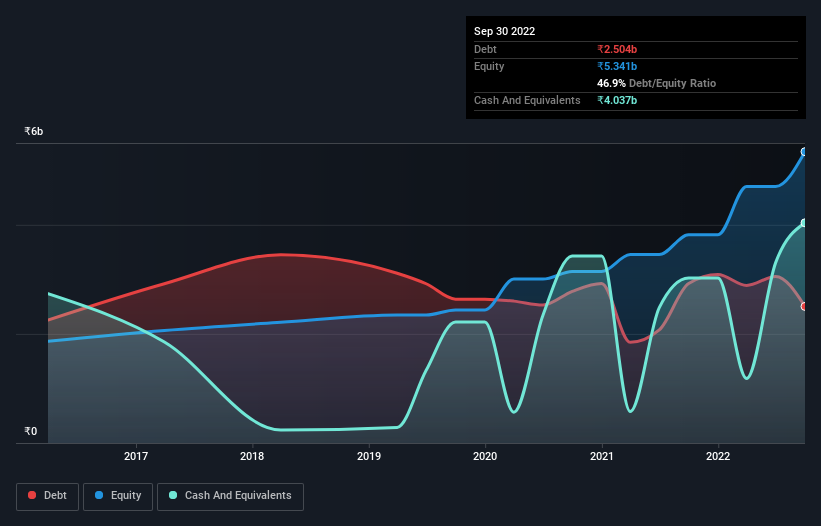These 4 Measures Indicate That Gokul Agro Resources (NSE:GOKULAGRO) Is Using Debt Reasonably Well

Legendary fund manager Li Lu (who Charlie Munger backed) once said, 'The biggest investment risk is not the volatility of prices, but whether you will suffer a permanent loss of capital.' So it seems the smart money knows that debt - which is usually involved in bankruptcies - is a very important factor, when you assess how risky a company is. As with many other companies Gokul Agro Resources Limited (NSE:GOKULAGRO) makes use of debt. But is this debt a concern to shareholders?
What Risk Does Debt Bring?
Debt and other liabilities become risky for a business when it cannot easily fulfill those obligations, either with free cash flow or by raising capital at an attractive price. Part and parcel of capitalism is the process of 'creative destruction' where failed businesses are mercilessly liquidated by their bankers. However, a more usual (but still expensive) situation is where a company must dilute shareholders at a cheap share price simply to get debt under control. Of course, the upside of debt is that it often represents cheap capital, especially when it replaces dilution in a company with the ability to reinvest at high rates of return. When we think about a company's use of debt, we first look at cash and debt together.
Our analysis indicates that GOKULAGRO is potentially undervalued!
What Is Gokul Agro Resources's Net Debt?
As you can see below, Gokul Agro Resources had ₹2.50b of debt at September 2022, down from ₹2.92b a year prior. But it also has ₹4.04b in cash to offset that, meaning it has ₹1.53b net cash.

A Look At Gokul Agro Resources' Liabilities
According to the last reported balance sheet, Gokul Agro Resources had liabilities of ₹12.8b due within 12 months, and liabilities of ₹2.21b due beyond 12 months. Offsetting this, it had ₹4.04b in cash and ₹3.23b in receivables that were due within 12 months. So it has liabilities totalling ₹7.72b more than its cash and near-term receivables, combined.
While this might seem like a lot, it is not so bad since Gokul Agro Resources has a market capitalization of ₹18.9b, and so it could probably strengthen its balance sheet by raising capital if it needed to. But we definitely want to keep our eyes open to indications that its debt is bringing too much risk. While it does have liabilities worth noting, Gokul Agro Resources also has more cash than debt, so we're pretty confident it can manage its debt safely.
On top of that, Gokul Agro Resources grew its EBIT by 71% over the last twelve months, and that growth will make it easier to handle its debt. There's no doubt that we learn most about debt from the balance sheet. But it is Gokul Agro Resources's earnings that will influence how the balance sheet holds up in the future. So when considering debt, it's definitely worth looking at the earnings trend. Click here for an interactive snapshot.
Finally, while the tax-man may adore accounting profits, lenders only accept cold hard cash. While Gokul Agro Resources has net cash on its balance sheet, it's still worth taking a look at its ability to convert earnings before interest and tax (EBIT) to free cash flow, to help us understand how quickly it is building (or eroding) that cash balance. During the last three years, Gokul Agro Resources produced sturdy free cash flow equating to 68% of its EBIT, about what we'd expect. This free cash flow puts the company in a good position to pay down debt, when appropriate.
Summing Up
Although Gokul Agro Resources's balance sheet isn't particularly strong, due to the total liabilities, it is clearly positive to see that it has net cash of ₹1.53b. And we liked the look of last year's 71% year-on-year EBIT growth. So is Gokul Agro Resources's debt a risk? It doesn't seem so to us. When analysing debt levels, the balance sheet is the obvious place to start. However, not all investment risk resides within the balance sheet - far from it. Case in point: We've spotted 1 warning sign for Gokul Agro Resources you should be aware of.
At the end of the day, it's often better to focus on companies that are free from net debt. You can access our special list of such companies (all with a track record of profit growth). It's free.
New: Manage All Your Stock Portfolios in One Place
We've created the ultimate portfolio companion for stock investors, and it's free.
• Connect an unlimited number of Portfolios and see your total in one currency
• Be alerted to new Warning Signs or Risks via email or mobile
• Track the Fair Value of your stocks
Have feedback on this article? Concerned about the content? Get in touch with us directly. Alternatively, email editorial-team (at) simplywallst.com.
This article by Simply Wall St is general in nature. We provide commentary based on historical data and analyst forecasts only using an unbiased methodology and our articles are not intended to be financial advice. It does not constitute a recommendation to buy or sell any stock, and does not take account of your objectives, or your financial situation. We aim to bring you long-term focused analysis driven by fundamental data. Note that our analysis may not factor in the latest price-sensitive company announcements or qualitative material. Simply Wall St has no position in any stocks mentioned.
About NSEI:GOKULAGRO
Gokul Agro Resources
Engages in the manufacture and trading of edible and non-edible oils, meals, and other agro products in India.
Outstanding track record with flawless balance sheet.
Similar Companies
Market Insights
Community Narratives



